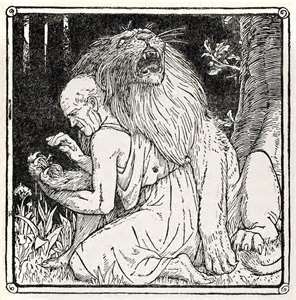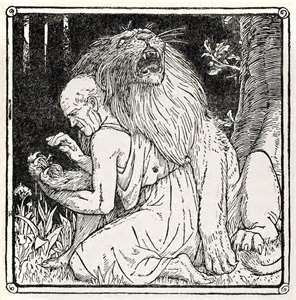Read the first paragraph at Thanksgiving dinner.
Ask the three questions that follow throughout dinner.
Thanksgiving in this life begins by looking up, changing within, and giving out.
Androcles, a young Roman slave, sought escape in the wilderness from his unhappy life. Finding respite in a cave, he found himself face to face with a lion. The beast was anxious only for the removal of a thorn from his paw. Upon its extraction by Androcles, the lion submitted to the man, caring for him. After being captured as a runaway some time later, Androcles was sentenced to death-by-mauling within the coliseum. However, the lion let loose upon Androcles was one and the same who had benefited from the slave’s earlier kindness. Instead of attacking the defenseless man, the lion lay at his feet, whereupon both were released by an astounded Roman governor.[1]
Aesop’s “Androcles and the Lion” prompts reflection on Thanksgiving. What should be our response to external grace? To whom do we say “thank you”? How does thankfulness change us? John Wilson’s review of Alexander McCall Smith’s latest novel The Lost Art of Gratitude suggests
McCall Smith . . . has created a fictional microworld to highlight aspects of the ungraspable Real . . . of our common life . . . the reader—savors the pleasures of food and companionship, the wonder of a child, the haunting presence of Brother Fox . . . And all this moves [the heroine] to immense gratitude, which the book itself unashamedly urges on us as well.[2]
Scott Cairns’ “Thanksgiving Poem” sparks our collective awakening to thanks which produces “widespread and pervasive . . . giddy gratitude I recognize.”[3] Peggy Noonan, America’s essayist-laureate, recounts the gratitude of
A friend who emigrated from Nicaragua 21 years ago and lives now in New York knew right away what she was thankful for: her still-new country. “I’m mainly grateful that I could raise my son in freedom. I could vote for the first time in my life. I could express my opinions without being shot on the spot, jailed, or exiled like my grandfather. I could sleep through the night without fearing for my life. I could work and buy food without rationing.”[4]
Roger Scruton reminds us that Americans in 2006 were far and away the largest private contributors to charities worldwide. He warns, however, that when government programs take over meeting the needs of people that “gifts are replaced by rights, so is gratitude replaced by claims. And claims breed resentment.”[5]
Not beholden to governments, we are beholden to each other. Thankfulness is the recognition that our fullness comes from caring people outside ourselves. W. H. Auden wrote a multi-section poem “A Thanksgiving for Habitat” which connected his physical home with personal friends. Each room, each event, each remembrance is directly linked to anticipation of renewing human bonds. My favorite, tear-stained stanzas include
Easy at first, the language of friendship
Is, as we soon discover,
Very difficult to speak well, a tongue
With no cognates, no resemblance
To the galimatias [gibberish] of nursery and bedroom,
Court rhyme or shepherd’s prose,
And, unless often spoken, soon goes rusty
Distance and duties divide us,
But absence will not seem an evil
If it make our re-meeting
A real occasion. Come when you can:
Your room will be ready.[6]
“The lines have fallen for me in pleasant places; indeed I have a beautiful inheritance.”[7] God’s goodness to us is our ultimate change agent. Ecclesiastes compares “life as a gift of God” with those who only see things “under the sun.” The refrain which runs throughout the book[8] establishes the baseline barometer for human purpose. Solomon calls to his readers for a shift of mindset.[9] For believers in The Personal Eternal Triune Creator, mindset shift is first upward, then inward, then outward.
To acknowledge life as a gift of God, one’s whole focus and concentration must be moved from ourselves to One outside ourselves. Disciples of Jesus as Lord bow the knee to their Sovereign Savior both in response to Who He is as well as what He has done. Appreciation is born out in worship.[10] Our love for God through others[11] brings joy in our God-given lives. “Androcles and The Lion” teaches the lesson: Thanksgiving in this life begins by looking up, changing within,[12] and giving out.[13]
Androcles and The Lion: Thanksgiving (First published, 27 November 2009)
Help Comenius reach its $40,000 giving goal this Thanksgiving! The Comenius Institute [501(c)(3)] (website here) Donate online (here), mark@comeniusinstitute.org, (text/talk 630.303.4891) Checks to “The Comenius Institute,” c/o Collaborate 317, 4202 N EMS Blvd #180, Greenfield, IN 46140 And ask Mark what Comenius would do with $1 million!
Dr. Mark Eckel is President of The Comenius Institute (website), spends time with Christian young people in public university (1 minute video), hosts a weekly radio program with diverse groups of guests (1 minute video), interprets culture from a Christian vantage point (1 minute video), and teaches weekly at his church (video).
[1] My retelling of the old tale is from James Baldwin’s retelling found in William Bennett’s The Book of Virtues (Simon and Schuster, 1993): 118-19.
[2] https://www.christianitytoday.com/bc/2009/novdec/gratitude.html?start=1
[3] Scott Cairns, “Thanksgiving Poem—for Franz Wright,” retrieved at https://www.christianitytoday.com/bc/2009/novdec/thanksgivingpoem.html
[4] Peggy Noonan, “Still Here After a Rough Year,” 20 November 09 Wall Street Journal Online. https://online.wsj.com/article/SB10001424052748704204304574546093616349588.html?mod=djemEditorialPage
[5] https://www.ttf.org/index/journal/detail/the-importance-of-gratitude/
[6] W.H. Auden. 1972, 2007. W. H. Auden: Selected Poems. “IX For Friends Only (For John and Teckla Clark)” in Auden’s multi-part poem “Thanksgiving for a Habitat” (Reprint, Vintage, Random House): 280
[7] Psalm 16:6 (ESV).
[8] 2:24-26; 3:13-14; 5:18-20; 8:15; 9:9.
[9] “Mindset” is defined as a pattern of thinking established through habitual practice of a philosophy.
[10] “Worship” is the total response of the total person to our Lord Jesus. “In all things He shall receive the preeminence” (Colossians 1:18) who has “reconciled all things to Himself” (1:20) that we should do “all things in the name of the Lord Jesus, giving thanks to God the Father through him” (3:17).
[11] Mark 12:30-31.
[12] I.e., 2 Kings 23:24-25.
[13] Gratitude signals acknowledgement that I am responsible to someone else. Christians practice thanks through prayer (Psalm 75:1) in all things (Ephesians 5:20). Cf. Acts 2:42-47; 4:32-36; 2 Thessalonians 2:15-17.




Enjoyed this Doc